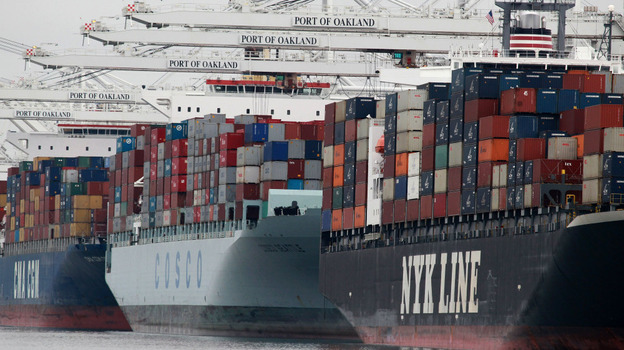Despite the popularity of slogans like, "Buy American," our trade deficits continue to soar. One proposal to address the problem is more detailed country-of-origin information on products to help shift American shopping habits. Meanwhile, the United States is pursuing a “NAFTA of the Pacific” trade agreement that would lower trade barriers with several Pacific countries. We explore how these ideas might affect the economy - and prices.Want to dig a little deeper into the views of some the people from the show? Try the following links and/or do your own digging around:
So, the show starts by stating the problem and defining the grand nemesis:
- We import ~$2T, we export ~$1.3T worth of goods and services. So, we have a trade deficit and need to work on increasing exports and reducing imports.
- Chinese (China - the biggest nemesis of all, but there are others) policies are skewed (currency manipulation, the policies against bringing american products in, etc.)
- Only something like consumer movement can change this
- Consumers buy based on preferences, appeal to consumers to support where "this" is made
- It is time for consumers to start looking at this (country of origin labeling)
- It is about consumers making an educated choice about what they want to support
- Take into account the ratio of who's buying from us - it's better to buy Korean made TV than Chinese (because our trade imbalance with Korea is not as bad as with China)
- Germans are buying more expensive, high quality German made products that last longer
- Trade agreements (like NAFTA) hurt us more than help us.
Wow, I don't know where to start. I guess I will comment on what appears easy to me first - trade agreements and skewed policies:
- I am of the opinion that just about any free trade agreement, even a unidirectional one (when we allow free imports without reciprocal free exports), is good for us. There's nothing wrong with bringing goods and services of value in. This allows us to buy want we need or want at lower prices. Of course, it is much better when our trade partners reciprocate.
- And who's paying the price of restrictive policies and who subsidizes currency manipulation? Well, the countries that impose them and manipulate them do. Apparently, they don't want their people and businesses to have access to great goods and services.
- Don't get me wrong, we need to continue to work on enhancing our current trade agreements and on trying to open new markets for our goods and services; this is going to remain work in progress for our diplomats, always. And BTW, American exports are up 34 percent since the president gave the State of the Union speech couple of years ago, and the number continues to rise. Check this out - "Made In The USA: An Export Boom"
Now, onto the most appalling part (IMHO) - the urgent need for the consumer movement to rescue our fragile economy and to set straight our trade policies. All these can, apparently, be accomplished via country of origin labeling and tapping into consumer's deep sense of patriotism. Isn't that swell? No, I don't have anything against country of origin labeling (other than a full realization that we, consumers, will pay for it, one way or the other); and I am very patriotic - but to me it means getting back onto the bandwagon of innovation and ingenuity and producing something we can be proud of, something that everybody wants (buying inferior quality products at higher prices is not patriotic - it is stupid). And there are plenty of positive examples - everybody wants to own an iPhone/iPod/iPad, to see the latest Hollywood flick, and to get advice from one of those Silicon Valley genius businessmen and entrepreneurs.
So, imagine that - we don't need to go back to the old-fashioned basics of making our workforce, our businesses, and our goods and services more competitive in this global world, we just need to appeal to the "smart consumers" to get us out of this mess.
I found it interesting that in the following quick video from the Harvard Business channel - "What's the Biggest Threat to U.S. Competitiveness?" nobody mentions the lack of country of origin labeling or dangerously low levels of consumer patriotism as threats to our competitiveness:
Though quite a few other things are mentioned, things like - poor public education; deficient immigration policies; rising debt (as a nation & as a people); overly complex tax structure; the lack of clear, long-term government policies; culture that values short-term financial returns at the expense of funding strategically important investments and goals (Wall Street quarterly projections rule); lack of investment in public goods (education, transportation, communications, etc.); globalization (a great opportunity and a threat - what does it mean for us?) Do I agree with these? - I don't know, but I can have a good, intelligent discussion on all of these issues. Country of origin labeling infused consumer patriotism? - Not so much.



Comments
Post a Comment